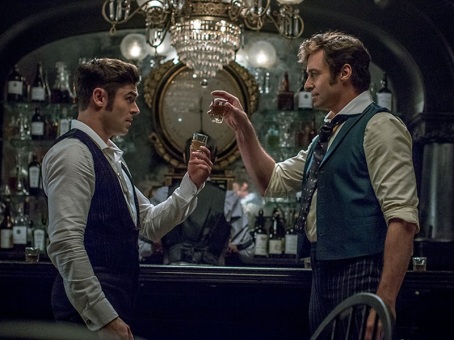2 out of 5 stars.
With stars like Hugh Jackman, Michelle Williams, and Zac Efron, a screenplay by Bill Condon and Jenny Bicks, and music by Oscar and Tony winners Benj Pasek and Justin Paul, it’s hard to see how a movie musical like “The Greatest Showman,” based on the life and career of P.T. Barnum, could go wrong. And yet, it goes so very, very wrong, a flashy spectacle that’s beautiful to look at and listen to, but so shallow that it’s often hard to sit through.
Many of those issues are with the screenplay, which takes a complex figure like Barnum and makes his screen version much less interesting than the real story. We open with Barnum as the child of a struggling tailor, who, after the death of his father, takes a job on the railroad, returning to New York many years later as an adult (and played by Hugh Jackman) to marry his childhood sweetheart, Charity (Michelle Williams), the daughter of a well-to-do family who don’t believe Barnum will ever amount to anything. And for several years, they’re right. In order to support his wife and two young daughters after losing another job, Barnum decides to open a museum of curiosities—primarily wax figures, but soon evolving into living exhibits, as Barnum recruits society’s misfits (including a midget, a bearded lady, and a pair of African-American acrobats) to be a part of what he would eventually call his “circus.”
Barnum’s circus is a massive success, especially among the lower classes; he becomes wealthy, and his troupe is even invited to appear before Queen Victoria in London, but those experiences just leave him wanting more. Desiring to elevate himself into more respectable society—and sell a show that’s real, not based around frauds and lies—he engages popular European singer Jenny Lind (Rebecca Ferguson) to go on a grand tour of the United States, a move that does bring him into high society, but at the expense of his family, friends, and the circus that started it all.

This is the gist of the story, which takes a ton of artistic license with the real Barnum’s life story. That’s to be expected of a narrative film, but the result actually twists reality in quite a distasteful fashion. Jackman is a great performer, but his Barnum is portrayed as a likeable father figure, to both his family and his performers. Even when he essentially casts away his sideshow friends in favor of the upper class, they don’t have any problem letting him back into their lives. This Barnum as only one path, one personality; the real Barnum had a varied and colorful career, not just in show business but in politics and as a philanthropist, among other things. His earliest museum oddities (most famously, the Feejee mermaid) were straight up hoaxes, but aren’t present in this film. Yes, he gave the downtrodden a shot at stardom and a career, but he also owned slaves and spear-headed many racist gimmicks and entertainment before advocating for emancipation later in his life. In this film, Barnum doesn’t hesitate to give the black acrobats W.D. (Yahya Abdul-Mateen II) and Anne (Zendaya) jobs while the rest of society excludes them. It’s all too sugary-sweet, and the resulting story feels shallow.
None of the supporting players seem to have much purpose in this story either. The real Jenny Lind dealt shrewdly with Barnum, agreeing to go on the tour to raise money for charities in her native Sweden; this Lind just ends up falling for him. The most unnecessary addition is Phillip Carlyle (Zac Efron), a playwright whom Barnum hires to be his business partner for some reason. But despite a few attempts to give him some backstory, Carlyle’s main purpose seems to be to be the voice of reason to the more impetuous Barnum, and to have a romantic subplot with Anne.
When it’s all said and done, what story there is really only exists to transition the film from music number to music number, which shouldn’t be surprising, seeing as how director Michael Gracey has only ever helmed commercial and music videos before. The costumes and sets are colorful and flashy, the choreography is energetic, and the songs, which range from pop ballads to peppy showstoppers, actually are quite enjoyable on their own, despite the obvious autotuning of everyone’s voices. The actors all appear to be having a good time and giving it their all, but unfortunately the rest of the film doesn’t serve them well. Any good movie musical needs to have a solid story to build up to the emotional impact of the music; this film wrongly places the music over the story, leaving us feeling next to nothing. If anything, they did succeed in making a film along the same lines as Barnum’s shows early in his career; flashy on the outside, but phony underneath it all.
Runtime: 105 minutes. Rated PG.
Thanks for the review Katie! I was wondering if I should see this movie. I will not.
LikeLiked by 1 person
If the screenplay was so shallow to not make the movie great, your review was good for me as you compared the differences in the movie characters and the real people. The real ones sound so much more interesting.
Thank you JC
LikeLiked by 1 person
I thought it was the perfect popcorn movie, it entertained and you come away with some good tunes to hum and some technical wizadry to admire.
LikeLiked by 1 person